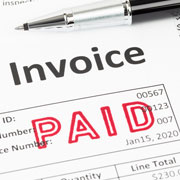DOs and DON’Ts to Help Avoid Collection Problems
Posted on September 15th, 2020
Many companies run into problems with customers or clients not paying their bills on time — or not paying at all.
The best way to avoid uncollectible bills depends on several factors — such as whether you sell products or services and the type of payment practices that are customary in your industry. For example, payment upon delivery may be more common in retail transactions but it is not common when providing services or in transactions between manufacturers and suppliers.
Despite the differences, there are some guidelines that can help most types of businesses. Your overall goal should be communication with your customers and clients. Specifically, here are some DOs and DON’Ts to consider.
DOs
Do explain to customers in detail what the prices, charges and fees are going to be. Even if the terms are in writing, it can be a good idea to also go over the details verbally so there are no surprises.
Do keep the proper books and records so you can provide information to customers. If your delinquent accounts wind up in dispute, or even possibly in court, proper documentation will be critical.
Do follow up quickly when a payment isn’t received. Start with a cordial phone call or e-mail reminder and increase the pressure if payment still isn’t received.
If a customer falls behind on payments, do call the party up immediately and attempt to work it out. Make sure the person calling is polite, firm and professional.
Do consider incentives for customers or clients to pay quickly. For example, you might offer a 2% discount for paying an invoice within 10 days instead of 30. Similarly, consider adding a reasonable late charge after the invoice is 30 days overdue.
If you can’t collect or settle the matter on your own, do examine all the alternatives, such as turning to a collection agency, using your attorney to pursue debtors and, in the worst case scenario, litigation (including small claims court). Obviously, the amount of the debt will determine how much money you want to spend collecting what is owed.
DON’Ts
Don’t shy away from talking about prices and fees because you’re afraid it will alienate customers or clients. The opposite is often true. Knowing the terms upfront makes customers and clients less likely to feel they’re getting hit with hidden fees.
Don’t summarize or send out brief explanations on invoices and expect the customer or client to know the details. Provide detailed records so that customers and clients know exactly what they were charged for.
Don’t continue doing more work, if possible, for customers if they begin falling behind in payments. Inform them that you are stopping until their accounts become current. Keep in mind that the longer a debt remains delinquent, the less likely it will be collected.
Don’t be rigid when it comes to collecting the full amount invoiced. You might have to negotiate and accept less if a customer has fallen on hard times.
Don’t automatically assess an unreasonably high late payment fee. While it might be a good idea to charge interest or a late fee on payments received after an invoice date, you have to follow federal and state laws before you assess such fees. (Many states have usury laws limiting the interest rates that can be charged.)
Don’t assume that just because you spend time and money to collect a debt that the amount will eventually be collected. Even if you file a lawsuit and receive a judgment, the other party may file for bankruptcy, have no assets to pay you, or you may find it difficult to discover where the assets are. Recovery can be a long process.
If your business continues to experience a high number of delinquent accounts, take a look at your procedures to extend credit. You may need to change your contracts or conduct thorough credit checks — especially with larger clients.

